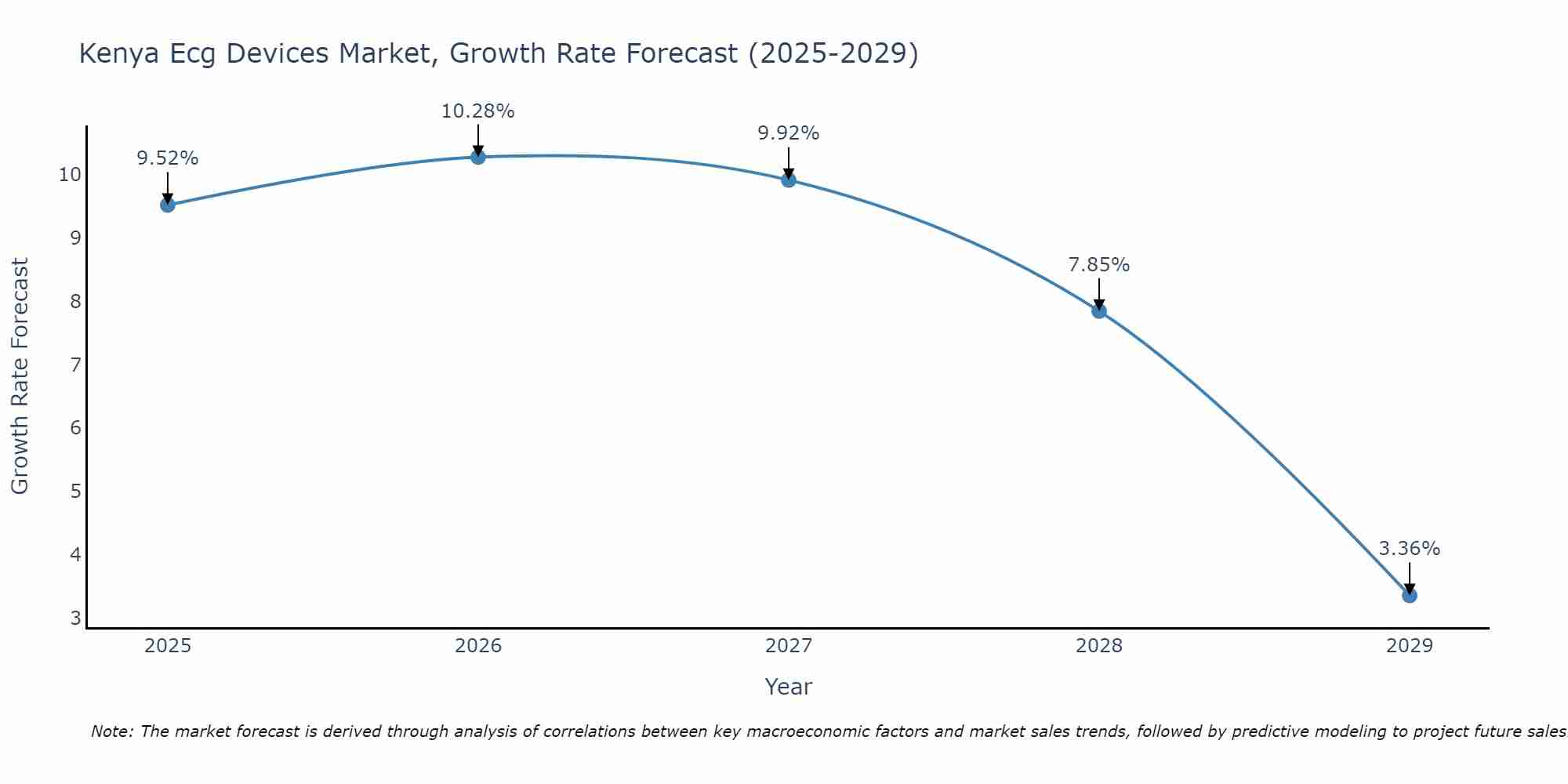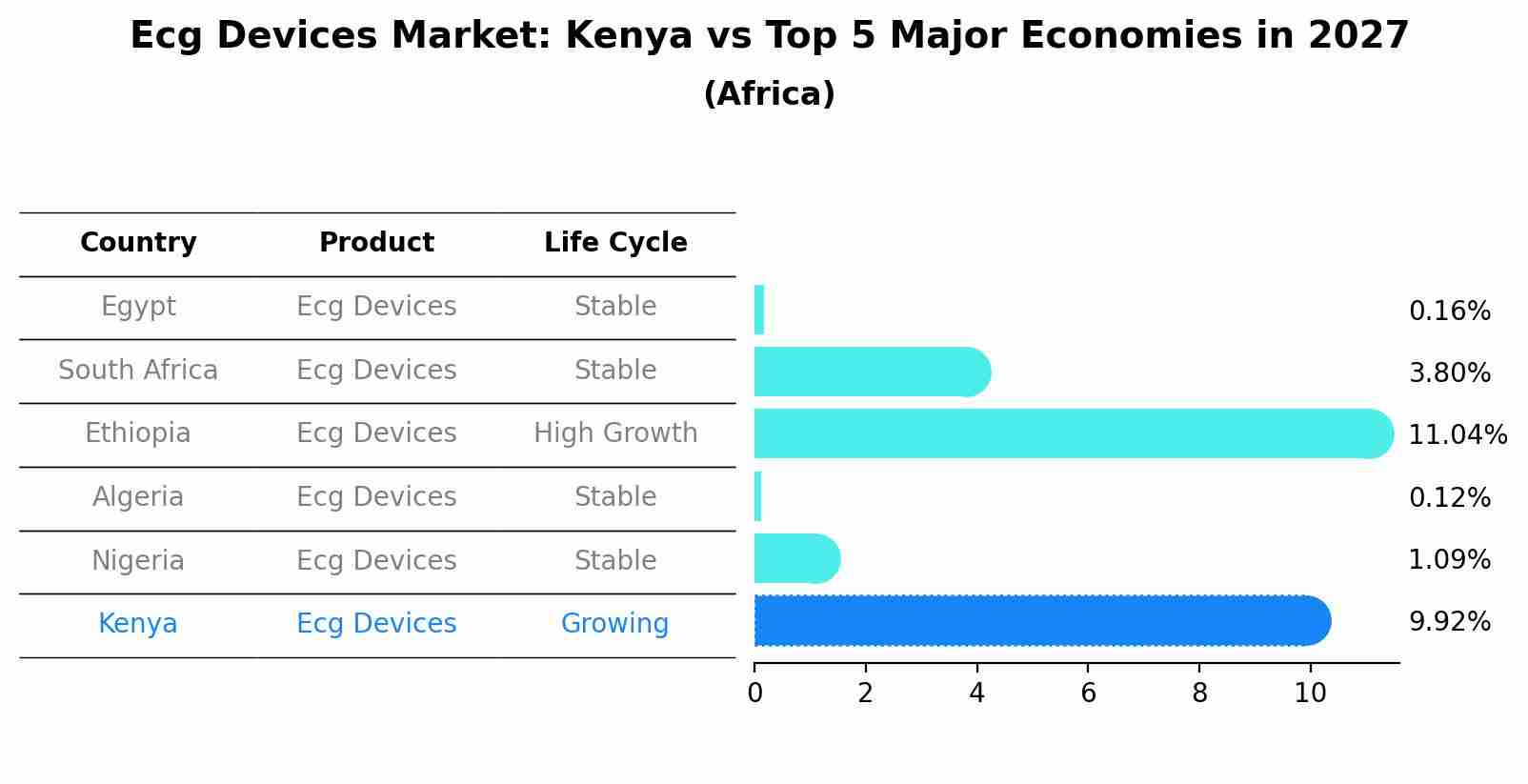Kenya Ecg Devices Market Outlook | Share, Growth, COVID-19 IMPACT, Companies, Industry, Value, Size, Forecast, Trends, Revenue & Analysis
| Product Code: ETC363410 | Publication Date: Aug 2022 | Updated Date: Aug 2025 | Product Type: Market Research Report | |
| Publisher: 6Wresearch | Author: Bhawna Singh | No. of Pages: 75 | No. of Figures: 35 | No. of Tables: 20 |
Kenya Ecg Devices Market Size Growth Rate
The Kenya Ecg Devices Market is projected to witness mixed growth rate patterns during 2025 to 2029. Growth accelerates to 10.28% in 2026, following an initial rate of 9.52%, before easing to 3.36% at the end of the period.

Ecg Devices Market: Kenya vs Top 5 Major Economies in 2027 (Africa)
The Ecg Devices market in Kenya is projected to grow at a growing growth rate of 9.92% by 2027, highlighting the country's increasing focus on advanced technologies within the Africa region, where Egypt holds the dominant position, followed closely by South Africa, Ethiopia, Algeria and Nigeria, shaping overall regional demand.

Kenya Ecg Devices Market Synopsis
The Kenya ECG devices market is experiencing steady growth driven by increasing prevalence of cardiovascular diseases and a growing awareness about the importance of early detection and monitoring of heart conditions. Key factors contributing to market growth include advancements in technology, rising healthcare expenditure, and government initiatives to improve healthcare infrastructure. Hospitals and clinics are the primary end users of ECG devices in Kenya, with a shift towards digital ECG systems for higher accuracy and efficiency. Key players in the market are focusing on product innovation and strategic partnerships to strengthen their market presence. The market is expected to continue its growth trajectory, supported by a growing aging population and increasing healthcare investments in the country.
Kenya Ecg Devices Market Trends
The Kenya ECG devices market is experiencing significant growth driven by factors such as the increasing prevalence of cardiovascular diseases, rising awareness about preventive healthcare, and the emphasis on early diagnosis and treatment. Technological advancements have led to the development of portable and wireless ECG devices, making monitoring more convenient for patients and healthcare providers. The market is also witnessing a shift towards digital health solutions, with the integration of ECG devices with telemedicine platforms for remote monitoring and consultation. Government initiatives to improve healthcare infrastructure and services are further driving the adoption of ECG devices in Kenya. Overall, the market is poised for continued growth in the coming years as the demand for efficient and cost-effective cardiac monitoring solutions continues to rise.
Kenya Ecg Devices Market Challenges
In the Kenya ECG devices market, some challenges include limited access to advanced healthcare facilities in rural areas, high cost of ECG devices leading to affordability issues for many healthcare facilities, and a shortage of skilled healthcare professionals trained in operating and interpreting ECG results. Additionally, inconsistent power supply in certain regions can hinder the effective use of ECG devices, while the lack of standardized regulations and quality control measures may result in varying levels of accuracy and reliability of ECG devices being used in the market. Overall, addressing these challenges will be crucial in expanding access to quality cardiac care and improving healthcare outcomes in Kenya.
Kenya Ecg Devices Market Investment Opportunities
The Kenya ECG devices market presents promising investment opportunities due to the increasing prevalence of cardiovascular diseases in the region, driving the demand for diagnostic tools like ECG devices. The market is characterized by a growing focus on preventive healthcare and technological advancements in ECG device capabilities. Investing in innovative and portable ECG devices tailored to the needs of healthcare facilities in Kenya could yield significant returns. Additionally, partnerships with local distributors and healthcare providers can help penetrate the market effectively. With the Kenyan government`s commitment to improving healthcare infrastructure and services, investing in ECG devices that offer accurate diagnosis, ease of use, and affordability can position investors for success in this growing market.
Jordan Agar Market Government Policies
The Kenyan government has implemented policies aimed at strengthening the healthcare sector, which includes regulations related to the ECG devices market. The Kenya Bureau of Standards (KEBS) sets standards for medical devices, including ECG machines, to ensure quality and safety. Importation and distribution of medical devices, including ECG devices, are regulated by the Pharmacy and Poisons Board (PPB) to guarantee compliance with set standards and guidelines. Additionally, the government has initiatives such as the Managed Equipment Services (MES) program to improve access to medical equipment, including ECG devices, in public healthcare facilities. These policies aim to enhance the quality of healthcare services and promote the use of advanced medical technologies like ECG devices across the country.
Kenya Ecg Devices Market Future Outlook
The Kenya ECG devices market is poised for steady growth in the coming years, driven by increasing awareness about cardiovascular diseases and the rising adoption of advanced medical technologies. Factors such as the growing geriatric population, lifestyle changes leading to higher incidences of heart-related disorders, and government initiatives to improve healthcare infrastructure are expected to fuel market expansion. Additionally, advancements in ECG device technology, such as portable and wireless devices for remote monitoring, are likely to drive market growth. With a focus on preventive healthcare and early detection of heart conditions, the demand for ECG devices in Kenya is projected to increase, presenting lucrative opportunities for market players to innovate and expand their product offerings to cater to the evolving healthcare needs of the population.
Key Highlights of the Report:
- Kenya Ecg Devices Market Outlook
- Market Size of Kenya Ecg Devices Market, 2021
- Forecast of Kenya Ecg Devices Market, 2031
- Historical Data and Forecast of Kenya Ecg Devices Revenues & Volume for the Period 2018 - 2031
- Kenya Ecg Devices Market Trend Evolution
- Kenya Ecg Devices Market Drivers and Challenges
- Kenya Ecg Devices Price Trends
- Kenya Ecg Devices Porter's Five Forces
- Kenya Ecg Devices Industry Life Cycle
- Historical Data and Forecast of Kenya Ecg Devices Market Revenues & Volume By Product Type for the Period 2018 - 2031
- Historical Data and Forecast of Kenya Ecg Devices Market Revenues & Volume By ECG Resting System for the Period 2018 - 2031
- Historical Data and Forecast of Kenya Ecg Devices Market Revenues & Volume By ECG Holter Monitoring System for the Period 2018 - 2031
- Historical Data and Forecast of Kenya Ecg Devices Market Revenues & Volume By ECG Stress Testing System for the Period 2018 - 2031
- Historical Data and Forecast of Kenya Ecg Devices Market Revenues & Volume By Cardiopulmonary Stress Testing System for the Period 2018 - 2031
- Historical Data and Forecast of Kenya Ecg Devices Market Revenues & Volume By End User for the Period 2018 - 2031
- Historical Data and Forecast of Kenya Ecg Devices Market Revenues & Volume By Hospitals for the Period 2018 - 2031
- Historical Data and Forecast of Kenya Ecg Devices Market Revenues & Volume By Diagnostic centre for the Period 2018 - 2031
- Historical Data and Forecast of Kenya Ecg Devices Market Revenues & Volume By Clinics for the Period 2018 - 2031
- Historical Data and Forecast of Kenya Ecg Devices Market Revenues & Volume By Ambulatory Surgical Centre for the Period 2018 - 2031
- Kenya Ecg Devices Import Export Trade Statistics
- Market Opportunity Assessment By Product Type
- Market Opportunity Assessment By End User
- Kenya Ecg Devices Top Companies Market Share
- Kenya Ecg Devices Competitive Benchmarking By Technical and Operational Parameters
- Kenya Ecg Devices Company Profiles
- Kenya Ecg Devices Key Strategic Recommendations
Frequently Asked Questions About the Market Study (FAQs):
- Single User License$ 1,995
- Department License$ 2,400
- Site License$ 3,120
- Global License$ 3,795
Search
Thought Leadership and Analyst Meet
Our Clients
Related Reports
- Afghanistan Apparel Market (2026-2032) | Growth, Outlook, Industry, Segmentation, Forecast, Size, Companies, Trends, Value, Share, Analysis & Revenue
- Canada Oil and Gas Market (2026-2032) | Share, Segmentation, Value, Industry, Trends, Forecast, Analysis, Size & Revenue, Growth, Competitive Landscape, Outlook, Companies
- Germany Breakfast Food Market (2026-2032) | Industry, Share, Growth, Size, Companies, Value, Analysis, Revenue, Trends, Forecast & Outlook
- Australia Briquette Market (2025-2031) | Growth, Size, Revenue, Forecast, Analysis, Trends, Value, Share, Industry & Companies
- Vietnam System Integrator Market (2025-2031) | Size, Companies, Analysis, Industry, Value, Forecast, Growth, Trends, Revenue & Share
- ASEAN and Thailand Brain Health Supplements Market (2025-2031) | Strategy, Consumer Insights, Analysis, Investment Trends, Opportunities, Growth, Size, Share, Industry, Revenue, Segments, Value, Segmentation, Supply, Forecast, Restraints, Outlook, Competition, Drivers, Trends, Demand, Pricing Analysis, Competitive, Strategic Insights, Companies, Challenges
- ASEAN Bearings Market (2025-2031) | Strategy, Consumer Insights, Analysis, Investment Trends, Opportunities, Growth, Size, Share, Industry, Revenue, Segments, Value, Segmentation, Supply, Forecast, Restraints, Outlook, Competition, Drivers, Trends, Demand, Pricing Analysis, Competitive, Strategic Insights, Companies, Challenges
- Europe Flooring Market (2025-2031) | Outlook, Share, Industry, Trends, Forecast, Companies, Revenue, Size, Analysis, Growth & Value
- Saudi Arabia Manlift Market (2025-2031) | Outlook, Size, Growth, Trends, Companies, Industry, Revenue, Value, Share, Forecast & Analysis
- Uganda Excavator, Crane, and Wheel Loaders Market (2025-2031) | Strategy, Consumer Insights, Analysis, Investment Trends, Opportunities, Growth, Size, Share, Industry, Revenue, Segments, Value, Segmentation, Supply, Forecast, Restraints, Outlook, Competition, Drivers, Trends, Demand, Pricing Analysis, Competitive, Strategic Insights, Companies, Challenges
Industry Events and Analyst Meet
Whitepaper
- Middle East & Africa Commercial Security Market Click here to view more.
- Middle East & Africa Fire Safety Systems & Equipment Market Click here to view more.
- GCC Drone Market Click here to view more.
- Middle East Lighting Fixture Market Click here to view more.
- GCC Physical & Perimeter Security Market Click here to view more.
6WResearch In News
- Doha a strategic location for EV manufacturing hub: IPA Qatar
- Demand for luxury TVs surging in the GCC, says Samsung
- Empowering Growth: The Thriving Journey of Bangladesh’s Cable Industry
- Demand for luxury TVs surging in the GCC, says Samsung
- Video call with a traditional healer? Once unthinkable, it’s now common in South Africa
- Intelligent Buildings To Smooth GCC’s Path To Net Zero


















